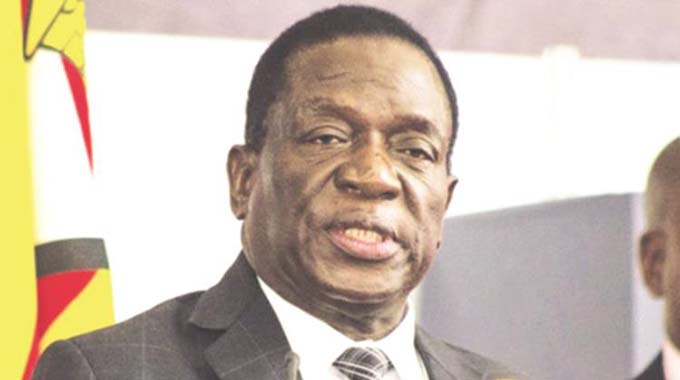ED’s economic, re-engagement policies laudable

Keith N Guzah Special Correspondent
Since President Mnangagwa assumed leadership in November 2017, Zimbabwe has marked a clear, positive trajectory that has given the country hope, underpinned by a new culture and work ethic, hence the nomenclature that this is a new dispensation.
Under the stewardship of President Mnangagwa, who is actually finishing off the term of his predecessor as he seeks his own – of which he is but assured – Zimbabwe has chalked investment commitments in excess of $16 billion.
In the past six months, 60 000 jobs have been created and 1 700 new companies have been registered, signalling positive momentum and the beginning of national prosperity.
President Mnangagwa is undoubtedly an epitome of the most pragmatic, stable and able leadership character suitable to lead Zimbabwe to the emerging middle income and wealth creation epoch. Experts define middle-income countries (MICs) as nations with a per capita gross national income (GNI) between $1 005 and $12 235. MICs are one of the income categories that the World Bank uses to classify economies for operational and analytical purposes.
There are some 109 MICs in the world – both low and high level, which President Mnangagwa want Zimbabwe to join.
MICs are essential for continued global economic growth and stability.
According to the World Bank, sustainable growth and development in MICs has positive spillovers to the rest of the world. Examples are poverty reduction, international financial stability and cross-border global issues, including climate change, sustainable energy development, food and water security,and international trade.
The President has himself pronounced his vision for Zimbabwe based on the position that the country is:
“We cannot remain mediocre; this is why we say Zimbabwe is open for business because we want to catch up, to leapfrog and catch up with other countries. And my mantra now, besides Zimbabwe is open for business, is that by 2030 we must be a middle-income country“ (The Sunday Mail, March 4, 2018).
Key anchors of the President’s vision include a policy of economic diplomacy, international re-engagement as well as domestic policies tackling underdevelopment, marginalisation, poverty and corruption.
Economic diplomacy and international re-engagement strategies executed under President Mnangagwa’s leadership have dramatically evolved Zimbabwe from a pariah state into a hyper-investment destination and a revered global citizen among the community of nations.
As testimony to this, last week data released in South Africa which ranks the most-in-demand domestic and international air routes from OR Tambo International Airport, Cape Town International Airport and King Shaka International Airport revealed that Harare was the top destination for South African travellers. South Africa is the country’s top investment partner and source market for tourists.
President Mnanagwa has managed to shape positive opinion of Zimbabwe.
On the other hand, he has pursued a policy of “engaging and re-engaging”, whereby Zimbabwe consolidates its existing friendships, reconnect with estranged friends and seek out new partnerships.
Domestically, President Mnangagwa’s relentless determination to grow rural economies is cutting a good model of inclusive economic transformation of folk in the ordinarily marginalised rural communities.
The architect of Command Agriculture himself, President Mnangagwa is leveraging the spectacular growth of the agricultural sector to usher an export-led economy and creation of jobs.
The recent commissioning of The Women’s Bank and capitalisation of the Youth Bank attest to President Mnangagwa’s economic empowerment vision of the people of Zimbabwe.
These and his business focus and impetus on the creation of strong institutions are a game-changer to the economic prosperity and dignity of the people of Zimbabwe. Thus the realisation of a middle-income society by 2030 is a solid possibility.
Under the leadership of President Mnangagwa, institutional memory will lead to the re-industrialisation of Zimbabwe’s economy, backed by enhanced production and competitive productivity. Buttressed by technological modernity, Zimbabwe will gain invincible traction and matchless speed.
The new shrewdness in the exploitation and optimisation of natural endowments that put to the fore national interest has shown much sleek speed in the economic development of Zimbabwe in the last six months.
On the other hand, zero tolerance to corruption will clean up the administration of governance and management of the economy, leading to more confidence in investments and efficiency in executing various projects and portfolios.
Conclusively, and in light of the above, it is beyond doubt that President Mnangagwa is truly an embodiment of intergenerational and timeless servant leadership who can best secure a healthy, safe, peaceful and prosperous destiny of all Zimbabweans, while providing a greater environment for creativity and innovation of the talents, skills, knowledge and imagination of all Zimbabweans, regardless of colour, creed or race.
As National Business Council of Zimbabwe, we urge all Zimbabweans to answer to the President’s contemporary mantra – “ Zimbabwe is Open For Business” and rally behind him during the forthcoming harmonised elections, on July 30 2018. We pray that all Zimbabweans remain peaceful and vigilant.
Hon Keith Guzah is the founder president of the National Business Council of Zimbabwe and immediate past president of the Affirmative Action Group. He is currently studying for a Law degree with a local University.










Comments